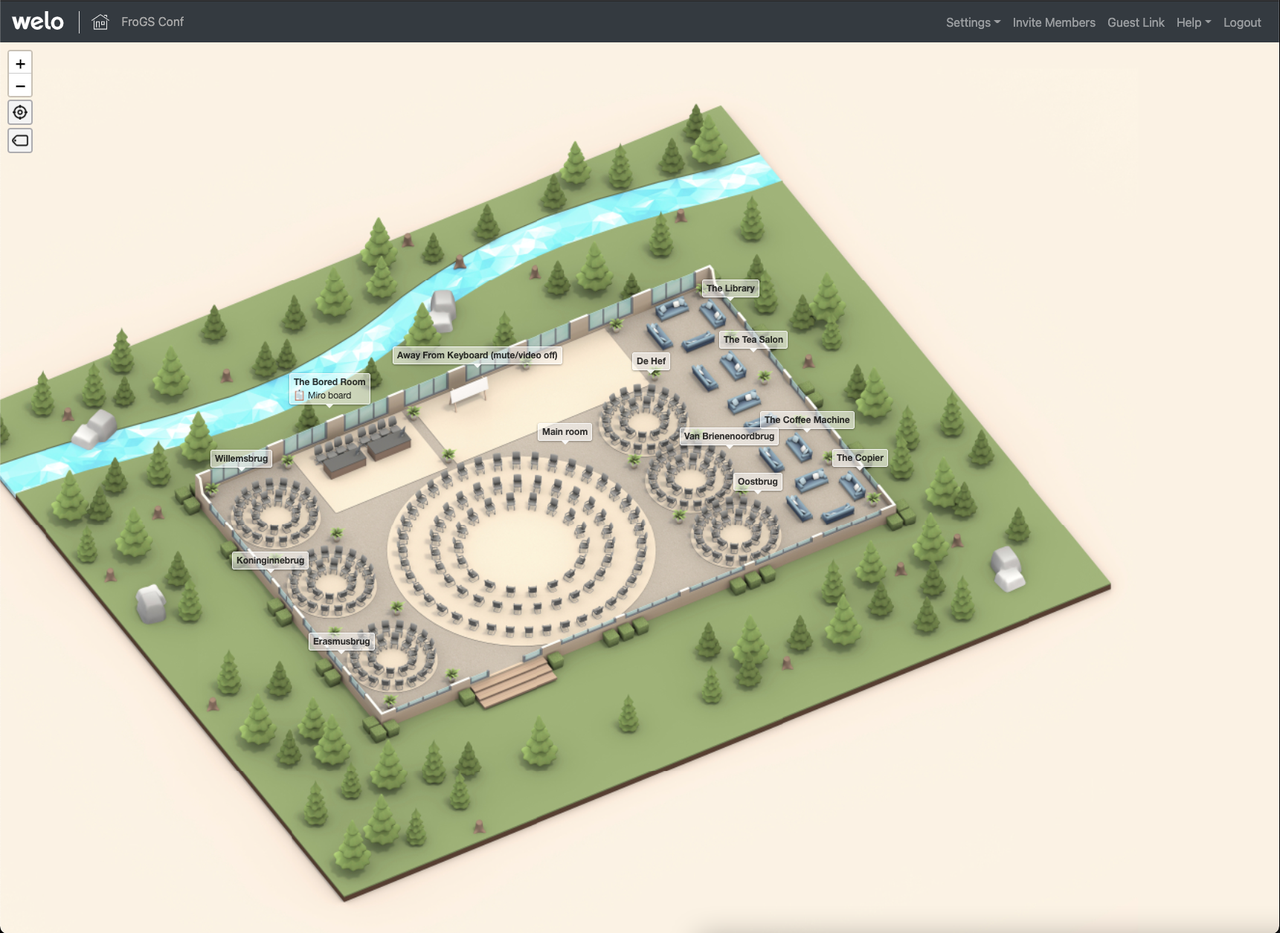Online Open Space Technology
I'm one of the organizers of the Friends of Good Software Conference, or as we like to call it: FroGS Conf. We've settled into a routine with our event schedule: two whole-day unconference per year on Saturdays, plus two hour-and-a-half lean coffees on weekday afternoons.
We've got participants who can only come on the weekend, or only come on a weekday, or can only come in a Americas-friendly time zone. We try to accomodate everyone, but not all at the same time. My fellow organizers and I are busy enough that it would be difficult to run events more often.
We've continued to FroGS as an online event because our participants are so global. The most important "technology" we use for the event is open space technology, which means that we organizers create a structure for everyone to hold sessions and share their ideas. You can read more about that at frogsconf.nl.
For our software tools, we've been using Welo, Miro, and Slack for all our events, and just recently replaced Google Forms and Sheets with MailerLite.
Welo
We've been using Welo as our video-conferencing tool. One of the previous organizers discovered the tool, kindly asked the founders if we could try it out, and we've been using the same goofy set of rooms by the river ever since. It lacks some of the finer audio filtering features of Zoom, but makes up for it in the visual representation of the space. You can see who's in which breakout room, so you can find people you want to talk to.
 Welo video conferencing software
Welo video conferencing software
Miro
Miro is our whiteboarding tool. We've got a bunch of different frames that fall into two categories: locked frames with explanations the organizers have prepared ahead of time, and empty frames for participants to contribute to.
Our locked frames
Our locked frames have explanations about: the code of conduct, the laws of an unconference, how Welo and Miro work, why the rooms are named the way they are, which rooms are rooms for regular sessions vs. hallway/breakout essions.
Our empty frames
Introduce yourself
We've got a frame for participants to introduce themselves. Forget someone's name or need their LinkedIn? There'll be a little card with their name, face, and contact info to help you out. We'd tried networking or get-to-know-you type activities to start the event in the past, but 10am is not the ideal time for that. We let the Miro board speak for us while we're still drinking our coffee or tea.
Marketplace Topic Queue
We've got a marketplace topic queue that we use at the start of the morning and the afternoon. This is where participants (and organizers!) write down their session proposal, with a title and a category. During the marketplace, they get to briefly pitch their session to entice others to join them. Once they've done that, they drag their stickie onto the...
Session frames
Our session frames double as a schedule for the day, and a place to take notes within each session. The organizers have set the structure of the day - how long the sessions last, how many there are - but the participants are the lifeblood of the event: bringing topics, running sessions, and taking digital notes on the Miro board.
Other whole-day frames
We've got frames for announcements and kudos, to help participants and organizers call our particular changes or high-fives that need to be distributed before the retro. We use the retro frame at the end of the day, though we encourage people to capture feedback for us throughout the day as it occurs to them. We close the day with a brief reflection, discussion, and hang out until the last of the stragglers need to sign off.
Slack
Our Slack is very quiet. We mostly use it amongst the organizers to coordinate our activities in between events. The chat feature in Welo is perhaps not optimal, so Slack can serve as a slightly less ephemeral/confusing place to type things to each other during the event.
MailerLite
We just added this tool to our toolbelt while preparing for our most recent event. We'd wanted to email past participants to advertise upcoming editions, but struggled with the Gmail limit of sending 50 emails at a time. We didn't want to be marked as spam. We also wanted to give past participants a straightforward way to unsubscribe from being bothered by us ever again, for both quality of life and GDPR reasons. Once our free trial with MailerLite ends, we'll pay a small monthly fee to maintain our email lists we'd previously cobbled together in a variety of Google spreadsheets.
Our lean coffee is a very small version of the big unconference day. We split up into groups small enough to foster a conversation, cut out the whole marketplace aspect, and just vote on items in the topic queue to drive the discussion. The Miro board's a lot simpler, but the rest of the tools are the same.
Thanks to my fellow organizers Huib Schoots, Sanne Visser, and especially Joep Schuurkes since he suggested I overcome my recent writer's block by writing about this topic. Reach out to one of us if you're interested in setting up your own unconference, lean coffee, or other type of structured-yet-unstructured event.